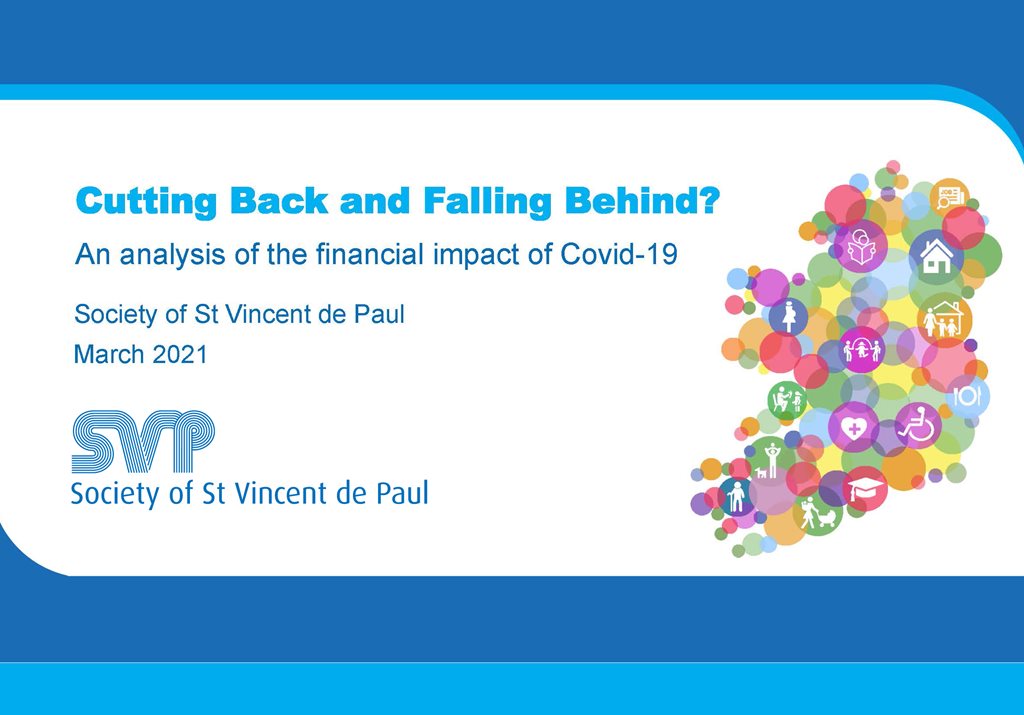
One-in-four people report cutting back on food and utilities due to pandemic and almost one-in-ten tenants report falling behind on their rent
A significant proportion of Irish society are facing a multitude of financial pressures due to the pandemic including loss of income, increased household expenditure on basics, erosion of savings to meet ordinary living expenses, falling behind on bills and being forced to cut back on essentials like food, heating and electricity according to RED C research commissioned by the Society of St Vincent de Paul (SVP).
Data from a representative sample of 1026 adults, shows that 43% of the population reported experiencing at least one form of financial strain due to the Covid-19 pandemic with:
- 24% cutting back on food, heating or electricity due to cost.
- 22% using savings to meet ordinary living expenses.
- 14% falling behind on bills such as rent, mortgages, utilities or other regular payments.
- 7% going into debt (personal loan, credit cards) to meet ordinary living expenses.
It finds that those who are experiencing the most adverse financial impacts are many of the groups that were vulnerable to poverty prior to the pandemic including low-income families with children, lone parents, renters, and people with disabilities.
During Covid-19, over a third of one parent families had to cut back on heating or had fallen behind on bills, and 25% had cut back on food due to costs increased expenditure on basics is hitting low-income families with children harder as they coped with the additional financial pressures associated with school closures.
For people unable to work due to illness or disability, 42% reported going without heating due to cost due to Covid-19, compared to 18% of people at work.
Dr. Tricia Keilthy, SVP Head of Social Justice said, “Lone parents and people with disabilities are the groups most at risk of poverty in Ireland today and Covid-19 has added huge additional pressures to these groups as they navigated the practicalities of self-isolation and increased food and energy bills from being home.”
The data also shows warning signs of financial distress among tenants, with almost one-in-ten renters reporting that they have fallen behind on their rent and a quarter stating they were in arrears on other regular payments. “We are concerned that if the eviction ban is lifted, and without a financial mechanism to address rent arrears, many people in the private rental sector will be put at risk of homelessness,” said Dr. Keilthy.
The Society says the current protections for tenants with Covid-19 related rent arrears are too narrowly defined, difficult to access and can be particularly challenging for vulnerable tenants to navigate.
The research shows that the financial impact of the pandemic is not felt evenly across the population. Of those who were finding it difficult to manage financially prior to the pandemic, 85% reported experiencing some form of financial strain due to Covid-19, compared to 21% of those who stated they were living comfortably prior to the pandemic. This group were also more likely to report a drop in income (51% compared to 25% of those living comfortably prior to the pandemic).
Furthermore, of those who were finding it quite difficult or very difficult to manage prior to Covid-19, 49% were spending more on essentials compared to 35% of those who were living comfortably.
“These findings point to a divergence in experience during lockdown, with those most vulnerable to financial strain and poverty feeling the brunt of the negative economic consequence of the pandemic. While the Government policy response has mitigated significant income losses through the pandemic unemployment payment and wage subsidy schemes, this data shows that additional interventions for those most at risk of financial distress are needed to ensure the public health crisis is not followed by a deeper debt, homelessness and poverty crisis,” said Dr. Keilthy.
The research found that the majority of people surveyed were living comfortably prior to the pandemic but a third of the population were just about getting by or finding it difficult to manage financially, indicating that many people were in a precarious financial position prior to the Covid-19 crisis.
“The pandemic has heightened and exposed long-term issues for people living on low incomes and in financial precarity. But there is an opportunity to build back better and bolster the financial resilience of households in Ireland by investing in our social infrastructure and supports,” she concluded.
A report on the results of the research entitled “Cutting Back and Falling Behind? An analysis of the financial impact of Covid-19” is available at www.svp.ie/financialimpactofCovid19

